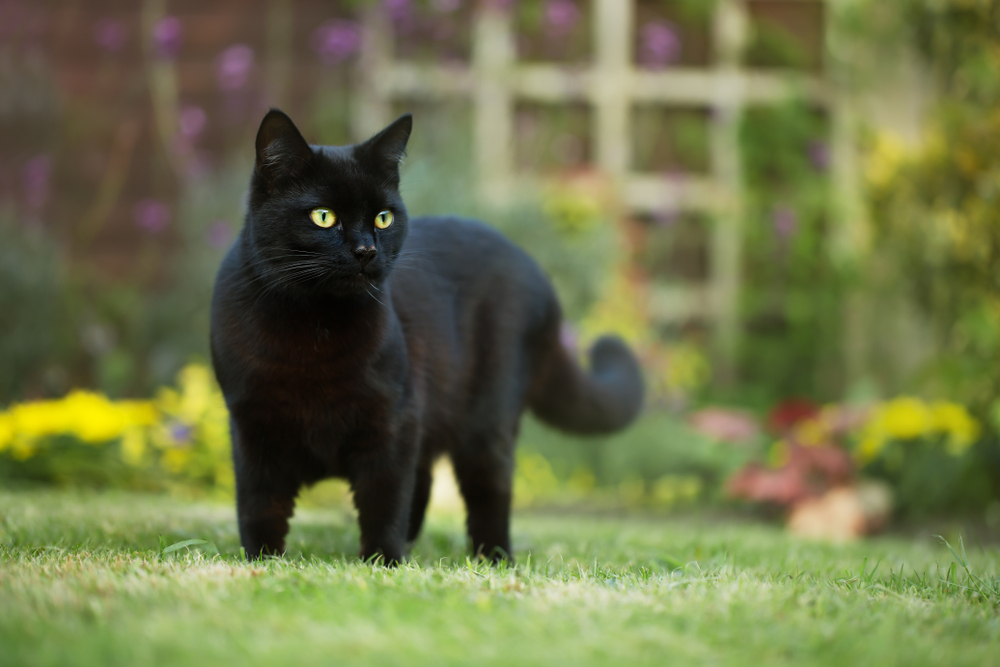Maybe it’s their mysterious nature. Or perhaps it’s the intimidating way they hiss and arch their back when provoked. One thing is for certain: Black cats have a reputation shrouded in intrigue and innuendo. But is it warranted?
If you’ve ever purposely gone the other way just to make sure a black cat doesn’t cross your path or felt the hair on the back of your neck stand up at the sight of a black cat on Halloween night, you may be wondering the same thing.
Simply put, black cats don’t have the best reputation. They’ve been accused of bringing bad luck, of being witches in disguise, and of being co-conspirators in black magic, among other things. The rumors aren’t true, of course. So, in honor of National Black Cat Appreciation Day (August 17), here’s how the rumors got started and what you really need to know about these maligned animals.

How did black cats get such a bad reputation, anyway?
Stories vary, but one popular version claims black cats’ bad rep began in Greek mythology. Evidently, Hera (Zeus’ wife) transformed her servant (Galinthias) into a black cat for spoiling her plan to interfere with the birth of Herakles. When Hecate, the goddess of witchcraft, took Galinthias in as her assistant, well … the whole black-cat-as-a-witch’s-sidekick thing was born.
Another explanation comes from Europe in the Middle Ages, where a father and son were rumored to have injured a black cat that crossed their path by throwing rocks at it. The cat took shelter from the attack with a woman who was rumored to be a witch. When the woman was seen, bruised and limping, the next day, locals assumed she was the black cat in disguise.
That encounter may have been the impetus for yet another myth that arose during the Great Plague, which killed an estimated 100,000 individuals in London. The bacterial infection was transmitted through the bite of a flea. As a result, as many as 40,000 dogs and 200,000 cats were killed because they were suspected of carrying the disease. Black cats, already scorned for their perceived sorcery, were now feared as plague-carrying grim reapers simply because they crossed the street in front of someone who would later perish from the plague.
And, of course, there’s that jet-black fur. The fact that it’s the same color as ravens and crows, which also have bad reputations, is just another strike against them.
So, are black cats unlucky?
Nope. In fact, owning a pet can actually make you healthier. In addition to the extra exercise pet owners get by playing with their furry friends, pet ownership lowers blood pressure, decreases stress, and combats loneliness by providing companionship.
Plus, think about how much value black cats lend the Halloween industry. Decorations of black cats with green eyes arching sinisterly alongside gruesomely carved jack-o’-lanterns and bowls of candy are a welcome sight for most treat-or-treaters. Black cat costumes are a favorite among young and old alike. With as many as 148 million consumers spending an estimated $8 billion on merchandise last year, black cats are definitely lucky for those in the business of selling Halloween.
So, as National Black Cat Appreciation Day approaches, maybe we should acquaint ourselves with myths that portray black cats as symbols of good luck. For example:
- Lucky in love. Single ladies in Japan believe black cats attract potential suitors.
- Safe travels. Sailors in Europe often brought along a black cat to ensure a safe journey (and to eat the mice on board).
- A sign of prosperity. In Scotland, a stray cat that appears on your doorstep is a sign that great wealth is headed your way.
- Black cats are divine. At least, that’s how the ancient Egyptians viewed them. They believed the gods lived within them.
- Good luck charm. Brides in parts of England often received black cats as gifts to bring them luck in their marriage. The French believe some black cats are magical beasts (matagots) and that feeding them brings good luck.
Why any cat makes a great pet
Of course, if you’re a cat owner, you already know that cats are great companions regardless of their color. Domesticated felines are quiet, low-maintenance, fiercely independent animals with a long life span. And despite their reputation for being mischievous, aloof, and strong-willed, the sound of contentment they make when they’re relaxed and happy is mentally and physically beneficial for anyone smart enough to curl up and listen.



